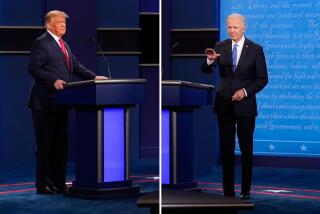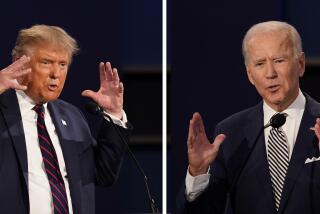Broadcasters Planning a Return to Regular Programming Today
- Share via
The major broadcast TV networks expect today to break from their wall-to-wall news coverage of the attacks on the World Trade Center and the Pentagon.
Although the announced lineup of Saturday programming includes news analysis, for the first time in several days the networks will bring back such escapist entertainment as “A Very Brady Movie” and “Touched by an Angel.” With it, national advertising is also expected to air again on the networks.
It is not happenstance that all the networks plan to take this critical step at the same time. In unprecedented fashion, CBS, Fox, ABC and NBC have been communicating with one another throughout the disaster, sharing plans and jointly weighing programming decisions.
“Everyone’s cards have been on the table,” said CBS Television President and Chief Executive Leslie Moonves.
Adds Fox TV Entertainment Group Chairman Sandy Grushow, “We’re all talking together.”
Extraordinary times lead to extraordinary changes in the way people do business, according to several network executives.
“A lot of the talk relates to the start of the new season, trying to figure out what makes sense,” Grushow said.
It has been expensive to suspend summer reruns and other shows that would have aired in last week’s regular schedule. The lost commercials alone cost the four major networks and their affiliates an average of $66 million a day, according to Kagan World Media.
But more important, the networks are counting on dramas and sitcoms to build their future audience. They want the fall season to premiere after the crisis has abated. Starting and then disrupting the new season could cripple the new shows, limiting their ability to find an audience.
Already, network ad sales for this season have fallen nearly 11% below last year’s totals. And the attack is expected to further an ongoing recession in the advertising market.
“Every day there has been a discussion. Are we ready to go back? And every day the answer’s been no,” Moonves said of discussions that start every morning within the network and then expand to phone conversations with individuals from rival networks later in the day.
On Friday, with President Bush in New York to talk to rescue workers at the World Trade Center after a morning of religious services, the networks collectively agreed that it was “appropriate” to start running advertiser-supported programming on Saturday.
“While we want to inform people about what is going on, at some point people are going to want to be entertained, to get their minds off of these images,” said Scott Sassa, NBC West Coast president.
This level of cross-network cooperation hasn’t been seen since the assassination of President John F. Kennedy in November 1963, according to Newton N. Minow, chairman of the Federal Communications Commission during the Kennedy administration.
“Television deserves a round of gratitude from the American people for the way they have handled this crisis. They deserve the highest praise. We benefit from sharing this experience together,” Minow said.
When asked whether there could be antitrust implications, Minow responded, “Absolutely not.”
Now an attorney with the firm of Sidley, Austin, Brown & Wood in Chicago, he said, “Anyone who says it’s a problem is nuts. Doing the right thing won’t hurt [the networks].”
Communications policy attorney and frequent network critic Mickey Gardner agreed. “Arguably, it falls under the good corporate citizen umbrella,” Gardner said. “It would be hard to give the networks a black eye for this. It is going to endear the networks to the American public.”
While executives with the other networks said that they had conversations with senior executives at ABC and its parent Walt Disney Co., the network denies taking part.
“We have not been calling the other networks,” said Zenia Mucha, ABC vice president for communications. “Our decisions are being made only in the best interest of our network. We are not communicating with the other networks in any unusual way.”
The crisis also has made it clear that there are only four major networks. Without a news department, UPN and WB switched back to regularly scheduled programming on Wednesday morning, running commercials.
It’s unclear which companies will be the first to buy ads in the networks’ weekend mix of entertainment and news programming, according to the networks. Those negotiations are continuing.
Some advertisers, particularly airlines, financial services firms and travel companies that could be associated with the disaster, have decided to stay off the air for now, they said.
Regardless, the networks’ plans remain subject to developments in the news.
“If there is a retaliatory strike, nothing else matters,” Grushow said.
*
RELATED STORY
No Laughing Matter: Comics gauge hunger of people for humor and a return to normality. F1
More to Read
The biggest entertainment stories
Get our big stories about Hollywood, film, television, music, arts, culture and more right in your inbox as soon as they publish.
You may occasionally receive promotional content from the Los Angeles Times.










